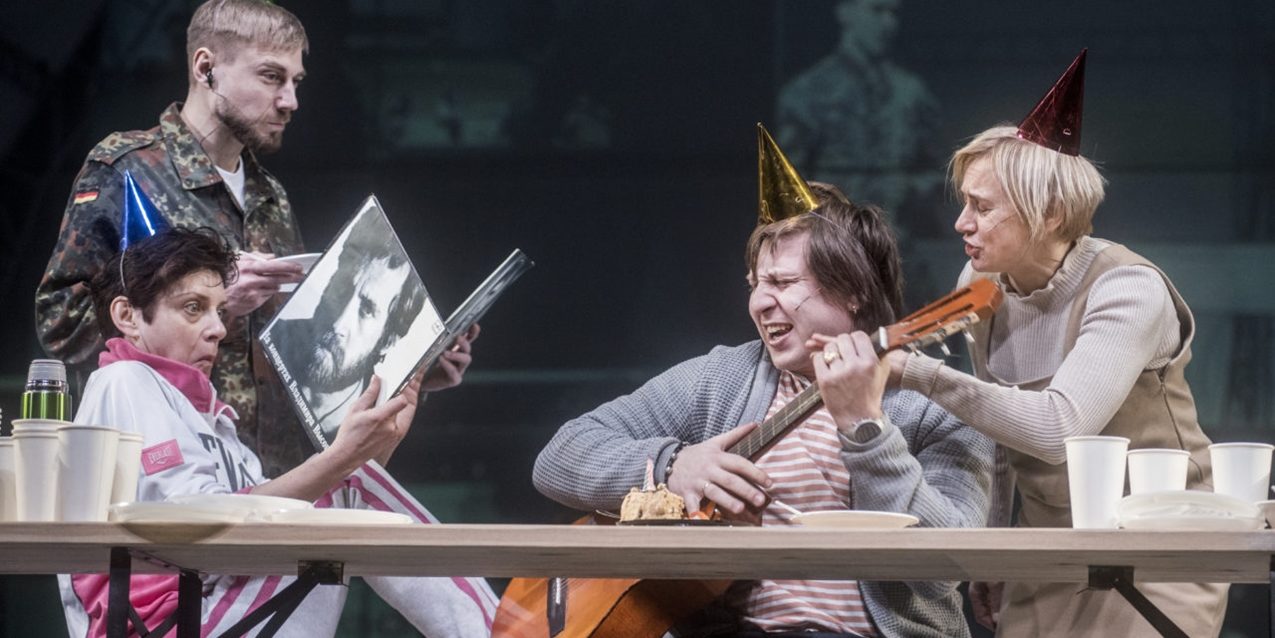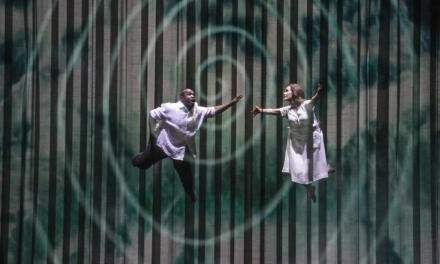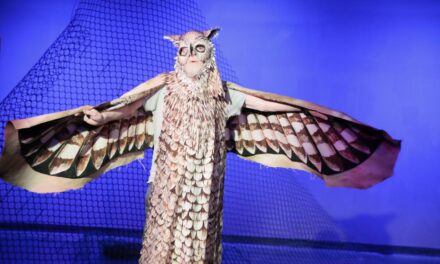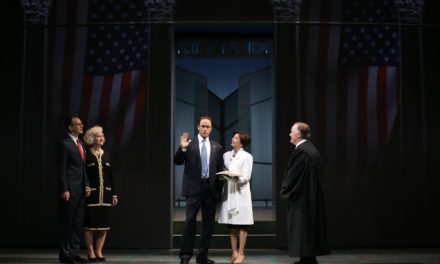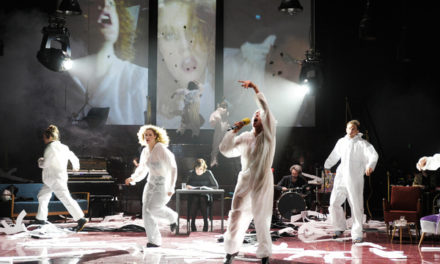Recorded by Alma Braškytė in June 2017
in Vilnius, Lithuania

Yana Ross. Photo by D. Matvejev
Yana Ross happens to have her home in Vilnius, Lithuania, in a house neighboring the National Drama Theatre. Her latest work, Three Sisters by Anton Chekhov, opened here in March 2017, but her personal and professional geography is much more broad and complex than this extreme proximity. Growing up in Latvia (with Polish, Ukrainian and Jewish roots), she started her theater studies in GITIS (Russian Institute of Theatre Arts) but left for the USA in her late teens. After completing her degree in mass-communications and doing international work in the field (including work for HBO and CNN), she turned back to theatre directing and received her MFA at Yale University’s School of Drama. Her way of seeing and making theatre though took her back to Europe in 2007. Since then she has been successfully working in Scandinavia, Poland, and Lithuania, harvesting best director awards in each consecutive country.
We met to talk about her latest work, her love for Anton Chekhov, and her trilogy (Uncle Vanya, The Seagull, and Three Sisters) that she directed in Sweden, Iceland, and Lithuania. We talked about her approach, which discards clichés of the romanticized, noble-minded playwright Chekhov and the lukewarm “universality” of his plays and makes it possible for her to discuss painful contemporary issues. We also touched upon new plays that Yana Ross staged in Warsaw and Vilnius, which penetrated the darkest depths of the human nature and about her method of working with actors: taking their personal history and individual traits as a precious material for performances, thus giving actors solid ground to stand on. We talked about the encounter with the Nobelist Elfriede Jelinek, which became key to the aspiring director in defining her own priorities in the theatre. Finally, we talked about how to bring theatre from the rearguard of other art forms to the avant-garde by turning timeless to timely.
We start with Our Class, which Yana Ross directed in Lithuanian national drama theatre in 2013, based on the contemporary polish play by Tadeusz Słabodzianek on holocaust and participation of the locals in the extermination of the Polish Jews during WWII – the tragedy still aching in Lithuania as well. Our Class has won the majority of seasonal prizes in Lithuania but also caused heavy controversy among the sparse Lithuanian Jewish society, showing the ambiguity of behavior on both sides – the executioners and the victims – and among the theatre community using the unusually drastic and at the same time distanced almost farcical theatre language.
Q: In an interview about Our Class you said: “it is impossible for us, contemporary theatre makers, to put ourselves in those peoples’ shoes. It would be false and inappropriate trying to imagine and express the feelings they had.” That sounds ethical and responsible, but the whole of theatre history would oppose. The interview is from 2013. Do you still support that position?
Yana Ross: This is quite a statement, I think… Human nature is volatile. We change, we adapt, we learn. This was me in 2013 and now it’s 2017, so I’m also curious what we will find during this conversation – am I the same person? Perhaps I was talking about that specific situation, the tragedy of the Holocaust as a documentary event. I find it quite obnoxious to create a character out of someone else’s personal tragedy. In part, the inspiration came from a playwright, Tadeusz Słabodzianek, who wrote a fiction based on documentary events. He studied the atrocities and the lives of people who had gone through this hell, but he modified and created his own version of those events. It’s not verbatim theatre, not documentary theatre – it’s an artistic attempt on behalf of a playwright to imagine what could have happened.
For my part, the impulse for that production was my relationship to time and place: we are very close to the moment when the documentary witnesses, the verbatim people who are still walking the streets of Vilnius will disappear. It stopped me one morning just thinking about how we’re living in a moment in time, that these atrocities will formally become part of history, they will become literature, they will be frozen in books, but there will not be real hot-blooded witnesses who could speak out.
The process was partly to find courage in ourselves to present the story, not to hide behind a character, not to create an illusion of knowledge. We can only try to represent the stories we were collecting. So I think that is where it was coming from. I don’t know if I can say the same about Chekhov or Ibsen. I would probably find a similar road, but it would be formulated in a different way. My theatre is not interested in this mimesis of a character or in manipulating audience’s emotions. I’m consciously turning away from that.
Q: Can you name any particular event (theatrical or not) that became revelatory for you or at least opened up for something new in your work as a director?
Working with Elfriede Jelinek was crucial in me “discovering” my kind of dramaturgy and kind of art I am still making. Art that is always in confrontation with itself: in terms of dramaturgy, in terms of theatrical language. I find Jelinek’s plays anti-theatrical. They’re anti-dramaturgy, have no characters, have no Aristotelian structure. They’re manifestos on hot-topic societal problems, and often have quite a gender-specific position – Jelinek writes as a woman passively observing the world of men.
I think this kind of slow-burn influence had a most lasting effect. I had to go away from it, to find it again and to use it in a different way. This kind of “anti-theatricalism” is important to me in working with actors on stage or how an actor is creating or not creating a character. How is the actor in relationship to the audience?
Working with Jelinek’s Sleeping Beauty (2006) and Bambyland (first produced in Lithuania, 2007) – was a taste of freedom in co-creation, this is what I took from Jelinek: her dramaturgy gives you total freedom to form a performance’s text. I got inspired by her allowing me to manipulate the language, to create characters, to structure the internal dramaturgy of performance. I think that has become a big foundation of my work. What I do now, with Chekhov, or with some marginal plays (like Franz Xaver Kroetz’ Request Concert – it’s a tiny play but it’s also a certain way of working with anti-dramaturgy) is to allow myself the freedom to create additional characters, multiply existing ones, or take some away. The idea to take Yelena’s lines and assign them to Telegin and games like that are probably coming from Jelinek.
Q: When did you discover Elfriede Jelinek’s plays?
In my student days, the first publication of Elfriede Jelinek’s work in English happened in Theatre Magazine, which is produced by Yale University, and our job as students was to participate in magazine’s daily life, so I remember reading proofs and thinking: this is a unique writer.
Q: Was this also the time when you met a Lithuanian theatre director Oskaras Koršunovas?
Yes. Once you set your mind on something things start to happen. My mind was set on the European theatre landscape. I focused on what I thought were the best theater cultures: Germany, Poland, and Lithuania. We studied Eimuntas Nekrosius at Yale, who has been at the Festival of Arts & Ideas in New Haven. But we met in Boston, at a new play festival, at the same time I got a Fulbright to Vilnius, so my fate was sealed.
Q: Let’s make a jump to a more recent time, let’s say the last five years when you’ve been working in Scandinavia, Poland, and Lithuania. Looking at what you have done during these years, Chekhov plays dominate the list. And your approach is very specific. You not only put the events of the play into our times (who doesn’t?) but add-in new text or blend-in contemporary philosophy, e.g. political or cultural manifestos, fragments from mass-media, put one character’s text into the other’s mouth. You even make daring changes in the plot (e.g. force one of the main – and well known to audiences – characters, who doesn’t die in the play, to commit suicide in your performance). You are not interested in that worn out “universality” of those plays, but focus on the most urgent questions and taboos of the contemporary societies wherever you go (Swedish, Icelandic or Lithuanian) by means of these beloved (or hated) Chekhov plays. Why this way? Why not choose a play by a contemporary playwright?
It’s like falling in love. It’s an infatuation, it’s a thrill of the first encounter. I fall for Chekhov. And that means that no other play can exist. Nothing else would do. I’m in love with that particular… person. I actually fall in love with him, not with a play. I cannot separate the writer from the literature. I think of that person who lived and made that particular play, and that’s how it starts. I start to think about him and why he was writing it then. This is how these issues in the play become so relevant and so here and now, I research and study to understand what it meant for him. When he was writing, what was his here and now?
Then it’s easy to cross that bridge because he is not some kind of god. He is a hot-blooded male next to me and we are in conversation on issues he is passionate about. And then I have to stay true to that love affair, I have to find the issues that would be relevant. The key, paradoxically, is that it’s the authenticity of the play that is demanding this contemporary adaptation because those were the issues then. The military in Three Sisters was very much a male brigade with the specific task of moving to Poland at the end of the play. So unless you solve it, unless you find what this military presence means in Europe right now, you will not activate the trigger. It will be this romanticized universal Chekhov that I could not care less for. I want the real Anton.
Q: You found NATO soldiers located in contemporary Lithuania and three daughters of the late Soviet officer growing older in increasing despair. This was your third performance in Chekhov’s trilogy (Lithuanian National Drama theatre, 2017). Uncle Vanya (Uppsala City theatre, Sweden, 2014) was the first. How did you get that play and that society to match?
In the center of Uncle Vanya is the issue of old money and inheritance. Sweden is perfect: they still have royalty, even old etiquette and formalities are still there as ghosts. People, of course, have adapted and forgotten a lot of these rules, but old money is still there. The burden of old money, as I found in workshops with actors, is a very relevant issue. People inherit these beautiful villas and they have to pay enormous taxes, they have to fix the leaking roofs. It becomes a disaster, a real practical problem.
That’s exactly what Chekhov was writing about, not about some abstract romantic rural estate. Of course, you can set the play in Vilnius, you can set it in Berlin, but you would have to take a different angle. It was easy to start improvising with actors about the impoverished aristocracy that Sweden still has. They made a lot of jokes about it. They knew people who still live like that. It hit very close to home.
Breaking the intimacy is a thread in all of my three Chekhov productions; it’s a way I try to manipulate a situation. In Chekhov’s time, a two-person intimate scene would be highly inappropriate. Yelena, a married woman, and Astrov in the room together looking at the map – scandalous! That can never happen! It’s about breaking all the societal rules. She’s a whore already in that situation, without lifting a finger, without even opening her mouth. In our time, paradoxically, the way to break societal rules is to allow ourselves misbehave in front of other people. That becomes ugly, unacceptable: a party is going on and somebody has a very inappropriate conversation, and five people pretend not to hear it. It often helps our team of actors to understand what Chekhov was searching for, what he was after. He was really brutal about opening societal wounds and putting people in embarrassing, uncomfortable situations. We have to create those situations because the society has changed, the etiquette has changed, the rules have changed – everything is different. But cruelty is the same.
Q: In The Seagull (2016, Reykjavik City theatre, Iceland), you focus on the destructive force of authority by showing the ruling generation manipulating and ruining young lives. On the other hand, Trigorin is trapped in his attempts to stay current and respected by society. He feels hunted and loses access to his own creativity.
You included a fragment by young Icelandic writer Eiríkur Örn Norðdahl about refugees driven out of the country without any tangible action of the police, just by the concept of authority in the refugees’ heads. This manifesto also focuses on Icelandic artists suffocating under pressure of the glory of the classic Icelandic literature from the past. Thus, two current issues of Icelandic society came into focus in your approach. Actors’ private experiences are also a key part of your directing. How does this work?
Both tragic endings [Sonia killing herself in the Swedish Uncle Vanja and Treplev recording video-diaries before killing himself in the Icelandic The Seagull– ed.], weren’t really planned. They were born from the process and were a part of the energy in the group and came out of the painful history that we carry as a group, as a society, as a reflection of this moment in time. Treplev’s video-diaries, which the doctor discovers post-mortem, are compiled of cuts we made to Act I, little snippets of him describing his mother.
Quite often, reality and fiction get blended. It opens up that energy, that void, and you get information from that. One member of our group went through this tragedy herself — she lost her son. That was an uncanny similarity to her situation. When we made those video-diaries, she only then told us that she also found her son’s diaries after he killed himself. Information is somewhere around you and if you’re listening, if you’re tuned in, you can pick parts of it for the right moment – that’s how performance falls in place. Astrov is an incredible environmentalist in real life. He’s an actor who doesn’t fly out of concern for the environment, he travels by train. So for him to deliver a monologue on environmental issues is not even acting, it’s a kind of mission.
I don’t hide it from actors, I always tell them that this is a way I work. I’m not always interested in creating a fictional character. I’m interested in their personalities, in their strengths, in their weaknesses. Making a performance becomes a process of bringing the two together – bringing yourself towards the character as opposed to the other way around. Somehow in this process, the actor becomes very grounded. And very confident. They have the right to talk like that. They share something as opposed to playing something. They represent something and I find it more exciting. One path of making theatre is that when you’re not running away from yourself you are, as a magnet, pulling the character out of the literature towards yourself.
Q: One could feel that was also the way you worked on your third Chekhov play, Three Sisters. (I still remember that both distant and penetrating gaze of Masha, played by Rimantė Valiukaitė, one of the leading actresses of the ensemble.) You know these Lithuanian actors so well. But how do you manage to reach this trust when you come to a new place, meet new people, and you have to deliver a product on time? How do things function? What is your recipe?
It’s crystallizing. With experience and practice, you develop a method and accumulate your tools. You do need more time for such an elaborate process. I try to divide it into two parts and to plant a seed long before we start making the performance. I will do a workshop in the spring in order to get to know the actors and then come back four months later. We start slowly in very informal workshop sessions. You start to see how the group functions, where alliances are, and where weaknesses are.
I was never a fan of table-work in the beginning. My first rehearsal would always be on our feet, running around, improvising, diving head-on into the work. Now I find myself realizing the benefit of sitting at the table. How long can we spend just digging? In the case of The Lake [by Mikhail Durnenkov, TR Warszawa 2016, Poland – ed. ], it was becoming quite dangerous. There was no room left to make anything, we just wouldn’t get up and make a scene. They would have those impulses: “Maybe we could try this?” “No, no, it’s too early, let’s talk about theme.” And we sat and brainstormed and worked at the table for five weeks! This is a normal rehearsal period in New York or London. I mean, this is when you make the whole show, even in four weeks. So we were one week over standard rehearsal time in this Anglo-Saxon way of making theatre! It’s also one of the big reasons why I work in Lithuania, Sweden, and Germany – it’s the necessity for time in the process. I don’t believe you can surprise yourself in four weeks. It’s almost impossible.
Q: The Lake, which you staged in the spring of 2016 in Poland, at theatre TR Warszawa is probably the most pessimistic performance of yours (even though your Chekhov trilogy is rather dark too). Does this extreme pessimism come from the play (which has parallels to themes of Chekhov’s and Maxim Gorky’s plays), or was it a reflection of the contemporary situation: not only are people deeply corrupted by inner conformism, but nature itself breaths out poison and mystical evil forces are lurking in every corner?
The play is very very dark. I think it’s a brilliant play. It’s prophetic, in a way. It’s really Biblical on many levels. It’s a kind of silent scream. It was a particular time in which I made it – looking back, it was when we did not have Drumpf, we did not have PIS in Poland [in fact this right wing populist party won majority in Poland in 2015 – ed. ], the world was on the brink and now I think we’ve really crossed the line. But there was incredible anxiety in the air of this self-destructive human nature. And now we can see the results.
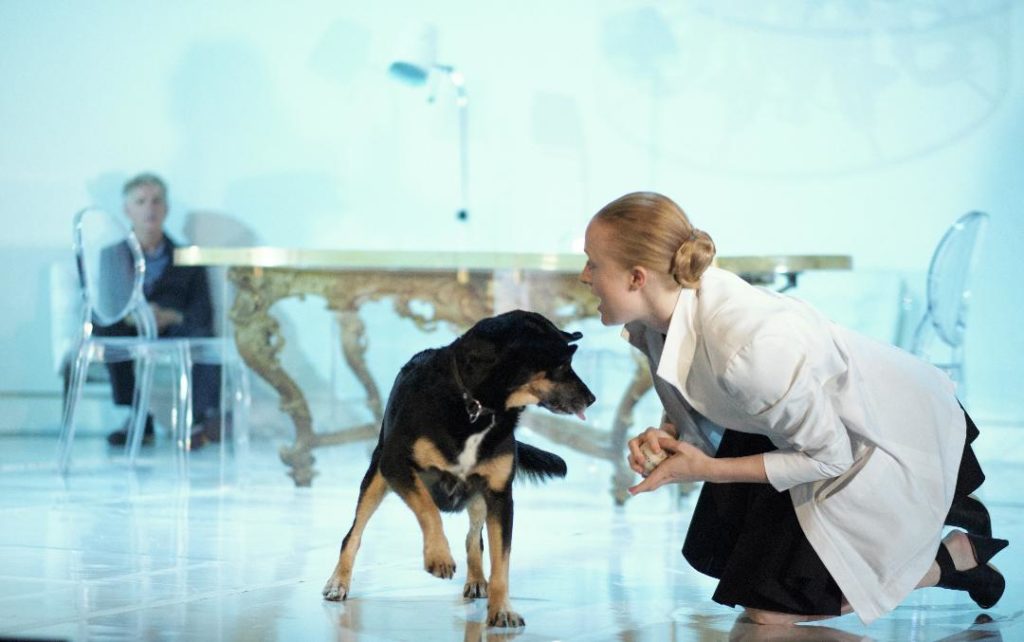
Bulgakov, Heart Of A Dog, Uppsala Stadsteater, 2016
I think this kind of artistic intuition, is necessary in order to find material through which you can speak about something that is in the air. You have to be quiet to hear what you have to say. Ideally, I like to work with that. This happened also with Mikhail Bulgakov’s Heart of a Dog in Sweden. I wrote an adaptation, a dystopia set in the near future of 2022. We sat down at the table with the actors and realized that what I‘ve written was happening around us. I was projecting a refugee crisis seven years from now and that now was in May 2015. It was an uncanny moment.
The theatre is incredibly slow. People often ask what the avant-garde is in the arts. The theatre is the rearguard, the last one catching up to new ideas. Things first happen in music, in visual art and other fields, but theatre often delivers quite late, as a post-script. I’m very curious about how to activate that trigger. How can you sense what is coming, or at least try to be relevant to the people who live today? What is relevant to them? Performance has a limited lifespan. When you watch a fifteen-year-old show on DVD, it’s often unbearable. And it’s not made for a DVD, it’s made for here and now. It makes theatre exhilarating and thrilling, but it also sets a limit: what was universal ten years ago might be obsolete right now. And then, of course, something from a hundred years ago will be relevant, but you have to take responsibility for that relevance. Of course, people will have love affairs and they will kill their children, but that doesn’t make it universal. That’s physiological, and it’s a law of human nature, but it doesn’t necessarily unite us.
Q: What is first for you as an artist – creating new forms, new language, or a socially engaged message?
The theme/idea and the message are crucial to me. The form is born out of everything else. Of course, theatre aesthetics are important, but I find in my work that the language adapts to the dramaturgy of performance. So, for example, in Our Class, it was a very specific form for that dramaturgy. How could we break that dramaturgy, twist something familiar so that it would look unusual? How do you approach this idea of Holocaust in a way that would make you see it anew? The theme and substance are important to me: what is the taboo, what is uncomfortable or painful in our society that needs a magnifying glass or needs attention, where do we stir the audience, what do we want to focus on for those two or three hours?
The theatrical language buttresses the idea and message. In The Lake, David Ogrodnik played a character of trauma, a tormenter – he is a memory. So how do you play a memory, someone who becomes a partner in your imagination? My costume designer, Anna Nykowska, and I were wrecking our brains: what does he wear to be so ephemeral, to be transparent? Whatever we put on him made him very real. Strangely enough, him being completely naked all the time crystallized that part. When he took the clothes off we also saw this stunning parallel to Piotr Pavlenskij (a Russian actionist whose image and allusions to his performances were part of the video design of Algirdas Gradauskas), and his body became a catalyst, a non-human face of fear. I’m not a fan of naked bodies on the stage. It happens, but it doesn’t come before the idea.
Q: You have just one mono-play on the list of your performances – Franx Xaver Kroetz’ Request Concert with Danuta Stenka, a darling of Wiener Festwochen Festival in 2016, which originated in Poland. Is it a coincidence that you always work with an ensemble, and that you make large-scale performances for the big stage, often with music performed live, elaborate scenery, lighting, and complex video projections? Is this a preference dictated by your interest in society’s mechanism rather than focus on a single individual?
Jean-Paul Sartre comes to mind with his infamous diagnosis: “Hell is other people.” If I’m going to study human soul and try to understand this term of “other people,” I need a group to isolate the individual by surrounding her/him with others. If we look at the theme of unhappiness in most Chekhov plays, characters are always surrounded by people. Others trigger your self-awareness. We are social creatures, we need someone to react to in order to feel emotion.
I do enjoy working with a big ensemble. For example, in Reykjavik City Theater, I had a strong ensemble of twenty-five actors, a group that has been together through many performances. This kind of depth that is necessary for working with Chekhov comes from trust they have for each other; they are a family. I have a deep affection for this kind of German repertoire ensemble system.
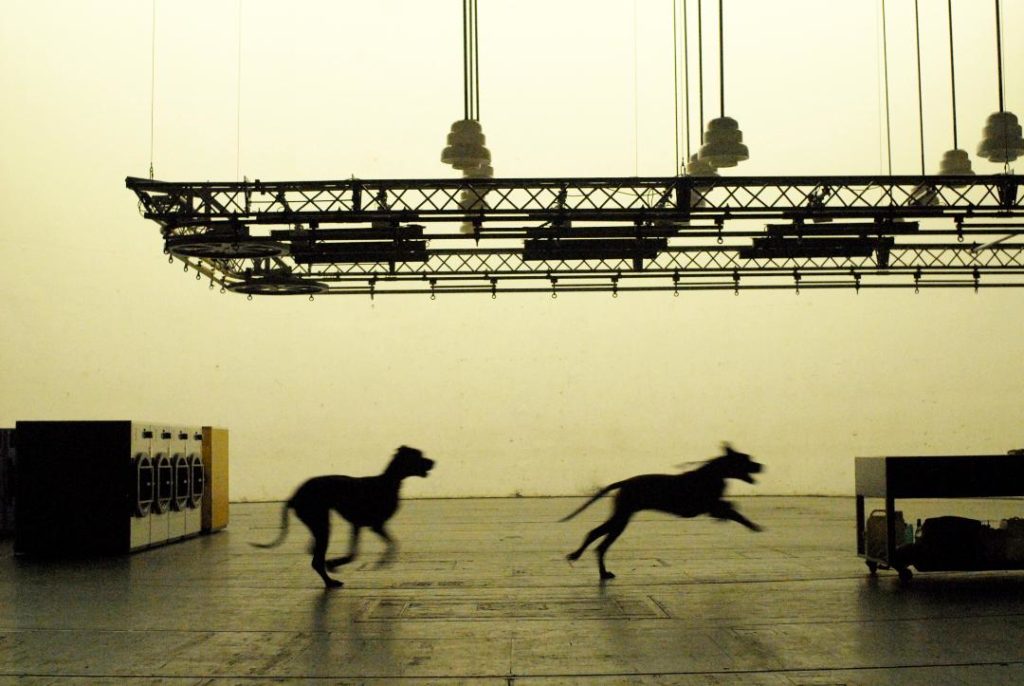
Heiner Müller, Macbeth, Volksbühne am Rosa-Luxemburg-Platz, 2008
My experience with German theatre has been extremely direct. Frank Castorf brought me to Volksbuehne in 2008 to Macbeth. A ‘baptism by fire” I would say, for a young director at the time. It was a radical experimentation with several dramaturgical sources and improvisations with actors. My struggle with Shakespeare has always been the disconnect between poetry and our reality – I decided that characters can only speak Shakespeare when they’re high on drugs! The rest of the story has been improvised, with new text devised in rehearsal. I experienced the full-on luxury of a well-oiled state mega house with a separate rehearsal building(!), bau-probe set, and six (!) dramaturgs in the room, ready to work all night long to decode videotaped improvisations. I got spoiled very quickly!
After my nomadic time in the North, I am preparing to go back to Germany and Switzerland in the next couple of seasons. It will be a good and necessary challenge.
Q: Which theatre personalities inspire you the most?
I am drawn to theatre-makers who are open, curious and critical of their own work. Those who are ready to change with times and circumstances, who have a healthy dose of self-irony to their success. Those who remain humble.
Right now, the most inspiring theater director for me, is Kornel Mundruczo, a Hungarian film-maker who makes theatre while he’s fundraising for his next film, almost like it’s a hobby. Perhaps that gives him the freedom to be so courageous on stage.
And Brecht, always a godfather!
Q: And your nearest plans?
A season of Ibsen in the North, and then off to Germany. Auf Wiedersehen!
This post was written by the author in their personal capacity.The opinions expressed in this article are the author’s own and do not reflect the view of The Theatre Times, their staff or collaborators.
This post was written by Alma Braškytė.
The views expressed here belong to the author and do not necessarily reflect our views and opinions.

